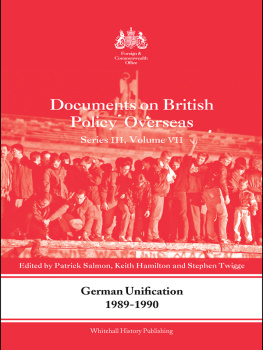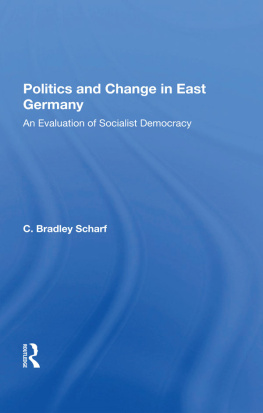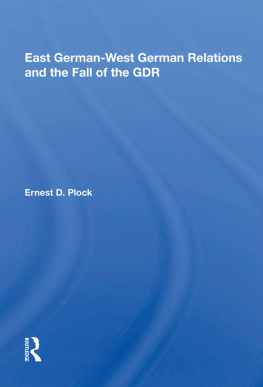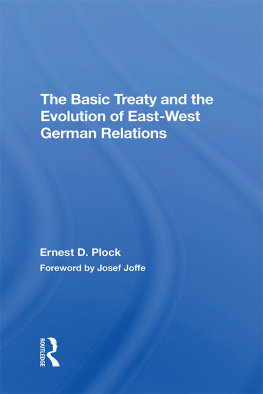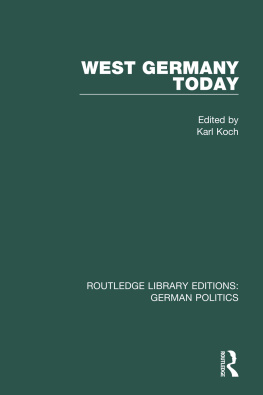THE OFFICIAL CONCEPT OF THE NATION IN THE FORMER GDR
The Official Concept of the Nation in the Former GDR
Theory, pragmatism and the search for legitimacy
JOANNA McKAY
Department of Politics and European Studies
University of Central Lancashire
First published 1998 by Ashgate Publishing
Reissued 2018 by Routledge
2 Park Square, Milton Park, Abingdon, Oxon, OX14 4RN
711 Third Avenue, New York, NY I 0017, USA
Routledge is an imprint of the Taylor & Francis Group, an informa business
Copyright J. McKay 1998
All rights reserved. No part of this book may be reprinted or reproduced or utilised in any form or by any electronic, mechanical, or other means, now known or hereafter invented, including photocopying and recording, or in any information storage or retrieval system, without permission in writing from the publishers.
Notice:
Product or corporate names may be trademarks or registered trademarks, and are used only for identification and explanation without intent to infringe.
Publishers Note
The publisher has gone to great lengths to ensure the quality of this reprint but points out that some imperfections in the original copies may be apparent.
Disclaimer
The publisher has made every effort to trace copyright holders and welcomes correspondence from those they have been unable to contact.
A Library of Congress record exists under LC control number: 97078097
ISBN 13: 978-1-138-33886-9 (hbk)
ISBN 13: 978-1-138-33890-6 (pbk)
ISBN 13: 978-0-429-44142-4 (ebk)
Contents
Until the collapse of East European communism in 1989, the GDR remained a state shrouded in mystery, existing in a position of isolation surpassed perhaps only by Albania, due to its questionable raison dtre and obvious vulnerability. Ironically it is a state that many outsiders have become acquainted with only after its demise. However, it continues to be the subject of much scholarly attention and debate - not least because a better understanding of this unique and ill-fated state helps us to comprehend why the process of German reunification has proved to be so painful, particularly at a psychological level. While many questions about former communist regimes may never be answered, several writers, including the present author, have been unable to resist the opportunity to find out more about the East German state - a state born illegitimate and upheld artificially, but which nevertheless shaped the lives of millions of people who live on today, even though their former country no longer features on the map of Europe.
This study focuses on one of the most difficult tasks faced by the leadership of the GDR, namely how to explain the division of the former unitary German nation without undermining the legitimacy of the state. This was all the more pressing with various other factors gnawing away at the legitimacy of the GDR at the same time. It uses previously unavailable archive material to identify the key factors which determined the official concept of the nation throughout the existence of the GDR, and pays particular attention to the input of theorists at state-run academic institutions.
I would like to thank numerous individuals and bodies who supported and assisted me in the initial research for this study, including Prof. Gordon Smith at the LSE and Prof. Michael Burleigh, now at the University of Wales, Cardiff; in Berlin I would like to thank Prof. Siegfried Prokop, the staff of the SED archive and all my interviewees, especially Prof. Alfred Kosing and Dr Jrgen Hofmann; and I would like to acknowledge the financial support I received over the years from the Economic and Social Research Council and the German Academic Exchange Service.
Finally I would like to thank my mother for her love and for tolerating the distance academia has placed between us, and my father for his technical support and unflagging interest in my work.
AdW
Academy of Sciences
AfG
Academy for Social Sciences
BArch
Federal Archives
CDU
Christian Democratic Union
CPSU
Communist Party of the Soviet Union
CSCE
Conference on Security and Cooperation in Europe
CSU
Christian Social Union
DDR
Deutsche Demokratische Republik
DKP
German Communist Party
EKD
Protestant Church of Germany
FDJ
Free German Youth
FRG
Federal Republic of Germany
GDR
German Democratic Republic
IfGA
Institute for the History of the Workers Movement
IMF
Institute for Public Opinion Research
IPA
Internal Party Archive
KoKo
Commercial Cooperation
KPD
Communist Party of Germany
NATO
North Atlantic Treaty Organisation
NL
Estate (Nachla)
NPD
National Democratic Party of Germany
NVA
National Peoples Army
PCC
Political Consultative Committee of the Warsaw Pact
SAPMO
Foundation of the Archive of Parties and Mass Organisations of the GDR
SED
Socialist Unity Party of Germany
SPD
Social Democratic Party of Germany
UN
United Nations
ZK
Central Committee
ZPA
Central Party Archive
For years social scientists have attempted to identify the essence of state and regime legitimacy and to find a means of assessing and comparing the legitimacy of individual states and regimes. It is generally accepted that legitimacy depends on voluntary acceptance of the state or regime by the majority of the population concerned, in spite of occasional opposition to specific policies or ventures, and that almost all rulers seek popular legitimacy. This may be on principle, as in democratic systems, or as a means to an end, as in authoritarian systems, for example, to enhance a claim to international recognition or to increase mass participation and productivity. Max Weber, Jrgen Habermas and Seymour Martin Lipset have all made significant contributions to the debate on the nature of state legitimacy,1 but the appropriateness of Western models in the assessment of the legitimacy of communist regimes is questionable.2 This is especially true in the case of the German Democratic Republic which was a truly unique state which defied categorisation and did not easily fit any theoretical models. While it could be argued that every country is unique, the GDR has rightly been described as more unusual than most3 due to the circumstances of its birth, the factors which sustained it, and the indisputable division of the German nation.
Like other ruling Marxist-Leninist parties, the Sozialistische Einheitspartei Deutschlands (SED) of the GDR went to great lengths to convince its citizens of the advantages of socialism and the legitimacy of the regime, and in this case, of the state itself, via a whole range of convoluted arguments and propaganda devices. This book focuses on the attempts made by the SED to fashion a Nationskonzept, i.e. a credible explanation of the GDRs relationship to the German nation, which had been divided into two states in 1949, that would establish the legitimacy of the socialist German state, both in the eyes of its own population and of the international community. Initially the SED portrayed the GDR as a model for a future united socialist Germany, and then later as a complete state in its own right. However, in view of the collapse of the regime in 1989 and German reunification the following year, we can tentatively conclude that the SED failed to convince its citizens of the GDRs right to exist, for given the choice in 1990, the majority of East Germans opted to become citizens of the Federal Republic.



